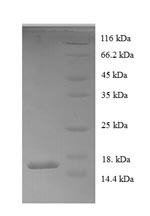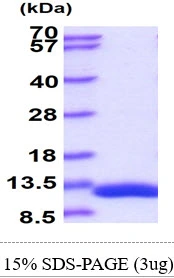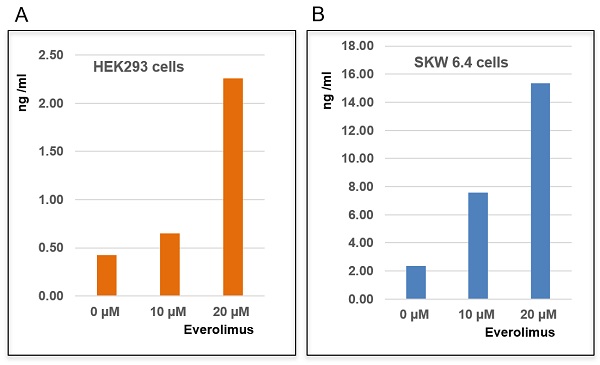Acyl-CoA-binding Protein (human) (rec.) (His)
AG-40B-0197
Protein IDP07108
Product group Proteins / Signaling Molecules
Overview
- SupplierAdipoGen Life Sciences
- Product NameAcyl-CoA-binding Protein (human) (rec.) (His)
- Delivery Days Customer10
- CertificationResearch Use Only
- Concentration1 mg/ml
- Estimated Purity>95%
- Gene ID1622
- Target nameDBI
- Target descriptiondiazepam binding inhibitor, acyl-CoA binding protein
- Target synonymsACBD1, ACBP, CCK-RP, EP, acyl-CoA-binding protein, GABA receptor modulator, acyl coenzyme A binding protein, acyl-Coenzyme A binding domain containing 1, cholecystokinin-releasing peptide, trypsin-sensitive, diazepam binding inhibitor (GABA receptor modulator, acyl-CoA binding protein), diazepam binding inhibitor (GABA receptor modulator, acyl-Coenzyme A binding protein), diazepam-binding inhibitor, endozepine, epididymis secretory sperm binding protein
- Protein IDP07108
- Protein NameAcyl-CoA-binding protein
- Scientific DescriptionAcyl-coenzyme A (CoA)-binding protein (ACBP) is an ubiquitously expressed 86 aa polypeptide that binds medium- and long-chain acyl-CoA esters with very high affinity. It plays a role as an intracellular carrier of acyl-CoA esters and regulates lipid metabolism in the cytoplasm of most cell types. In addition to its function within the cells as acyl-coenzyme A (CoA)-binding protein, ACBP also functions as secreted protein called Diazepam-Binding Inhibitor (DBI) that can interact with the benzodiazepine-binding site of the gamma-aminobutyric acid (GABA) type A receptor, GABAAR, and modulate its activity. ACBP is secreted upon induction of autophagy (energy deficiency) in different organisms including mouse and human. ACBP levels correlate with human body mass index (BMI). Increasing ACBP levels in mice triggers lipogenesis, food intake and weight gain and neutralization of ACBP increases lipolysis, reduces food intake post-starvation and causes weight loss in mice. Obese patients exhibit elevated plasma levels of ACBP, while a reduction in the ACBP mRNA and ACBP plasma protein levels is observed in these patients after an important weight loss. ACBP might be useful for the prevention or treatment of obesity and metabolic syndrome diseases. - Recombinant protein. Human acyl-CoA-binding protein (aa 2-87) is fused at the C-terminus to a His-tag. Endotoxin: <0.01EU/microg purified protein (LAL test). Lyophilized. Contains PBS. Acyl-coenzyme A (CoA)-binding protein (ACBP) is an ubiquitously expressed 86 aa polypeptide that binds medium- and long-chain acyl-CoA esters with very high affinity. It plays a role as an intracellular carrier of acyl-CoA esters and regulates lipid metabolism in the cytoplasm of most cell types. In addition to its function within the cells as acyl-coenzyme A (CoA)-binding protein, ACBP also functions as secreted protein called Diazepam-Binding Inhibitor (DBI) that can interact with the benzodiazepine-binding site of the gamma-aminobutyric acid (GABA) type A receptor, GABAAR, and modulate its activity. ACBP is secreted upon induction of autophagy (energy deficiency) in different organisms including mouse and human. ACBP levels correlate with human body mass index (BMI). Increasing ACBP levels in mice triggers lipogenesis, food intake and weight gain and neutralization of ACBP increases lipolysis, reduces food intake post-starvation and causes weight loss in mice. Obese patients exhibit elevated plasma levels of ACBP, while a reduction in the ACBP mRNA and ACBP plasma protein levels is observed in these patients after an important weight loss. ACBP might be useful for the prevention or treatment of obesity and metabolic syndrome diseases.
- Storage Instruction-20°C,2°C to 8°C
- UNSPSC41116100
- SpeciesHuman



